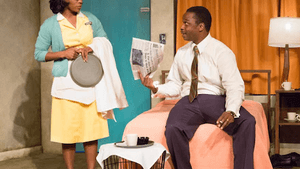Stay in the Loop
BSR publishes on a weekly schedule, with an email newsletter every Wednesday and Thursday morning. There’s no paywall, and subscribing is always free.
MLK’s work continues
People's Light presents Katori Hall's 'The Mountaintop'

Katori Hall’s The Mountaintop puts the magic and the realism into “magic realism,” crafting a play that’s much more than a portrait of famous historical figure Dr. Martin Luther King Jr.
The popular play, one of the most produced over the past two U.S. seasons, takes place in King’s Memphis hotel room on April 3, 1968, the night before he was killed. Director Steven H. Broadnax III’s production at People’s Light & Theatre Company provides a dingy-looking two-bed room designed by Tony Cisek, but its very realism is what makes it seem abstract. This set is built with a forced perspective, meaning the walls and floors angle upstage to accentuate its depth, and it includes a full ceiling, rarely seen in theatrical sets. The effect makes the room look bigger than it is, but also more claustrophobic, and Cisek’s set has some surprises for us later.
Will they or won’t they?
The characters also start realistically, but expand into abstraction as the play progresses. Bowman Wright plays King, sounding like a veteran politician on the phone to his team members. He becomes more personal with maid Camae (Patrese D. McClain), engaging in a flirtation that keeps her in the room, though it’s balanced by phone conversations with his wife and kids, and her reluctance to take it farther. That’s the play’s tension at first: will they or won’t they?
However, The Mountaintop isn’t a play about King’s infidelities. The pair discuss current issues, including King’s concerns about “police shooting innocent folk” during the Memphis garbage collectors’s strike. He asks, “If you were me, what would you do?” Camae tells him, sharing her whiskey and cigarettes.
They discuss race relations, too: “Name one thing we all have in common,” Camae challenges. King replies, “We’re scared.” King worries about death threats, dissension from all sides, and his legacy.
Beyond its time and space
Though The Mountaintop might work well as just an intimate look at the legendary man the night before his tragic death, Hall has a larger agenda. Without giving it away (I love surprises in plays), I can explain that Camae is more than she appears. Once her secret is revealed, hokey though it is, the play blasts off into another dimension that propels King’s legacy and influence into our present, aided with Katherine Freer’s vivid video projections which transform Cisek’s set into a three-dimensional screen. Much has happened, and yet not much has changed, we realize. King’s work continues.
Therein lies the beauty of The Mountaintop: it both captures a plausible moment (Hall’s mother Carrie Mae Golden, also known as “Camae,” wanted to hear King speak, but Camae’s own mother, fearful of a bombing, did not let her) with tenderness and humor, then expands to larger themes and contemporary relevance with theatrical flair, exceeding expectations.
What, When, Where
The Mountaintop. By Katori Hall, Steve H. Broadnax III directed. Through Oct. 30, 2016 at the People's Light & Theatre Company, 39 Conestoga Rd., Malvern, Pa. (610) 644-3500 or peopleslight.org.
Sign up for our newsletter
All of the week's new articles, all in one place. Sign up for the free weekly BSR newsletters, and don't miss a conversation.

 Mark Cofta
Mark Cofta